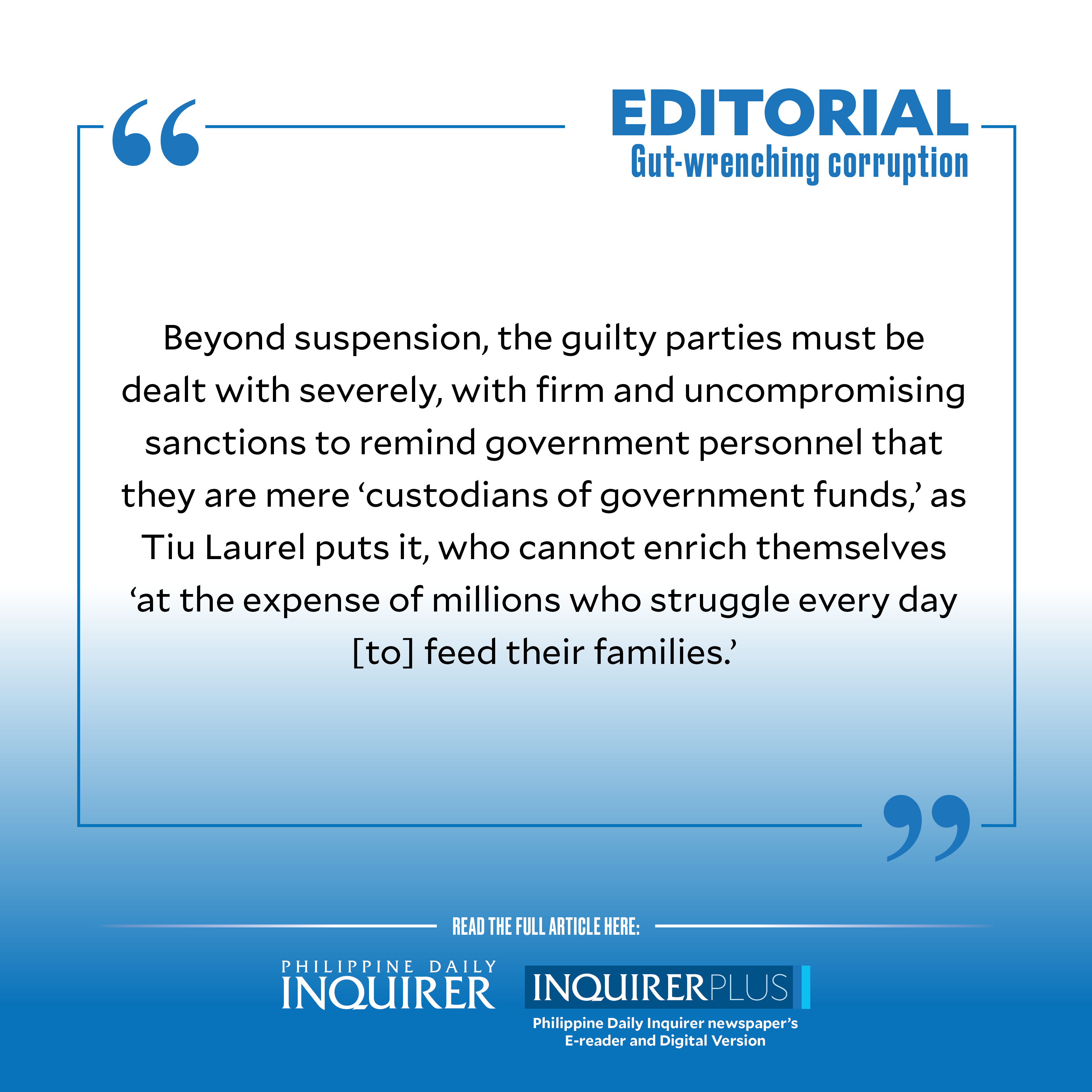Gut-wrenching corruption

Rice being a staple in Filipino households, any wastage, weather disturbance, or malfeasance that leads to a supply shortage or price increase has the impact of a national crisis.
Which makes the recent Ombudsman order to place 139 officials and employees of the National Food Authority under preventive suspension for six months, the most appropriate response to the alleged sale of NFA rice stocks at prices “greatly disadvantageous to the government,” as Department of Agriculture (DA) Secretary Francisco Tiu Laurel Jr. describes it.
The suspended officials, including NFA administrator Roderico Bioco and assistant administrator for operations John Robert Hermano, are being investigated for allegedly authorizing the sale of milled rice stored in the agency’s warehouse at P25 per kilo without the required public bidding. Bioco allegedly authorized the sale of 75,000 bags of NFA rice worth P93.75 million to favored traders.
Unfit for human consumption
Also suspended over “the controversial sale of rice buffer stocks” are 12 regional managers, 27 branch managers, and 98 warehouse supervisors.
In its defense, the NFA said the agency is allowed to dispose of aging rice stocks “up to 10 percent lower than the mandated price.” Its statement added that while freshly milled stocks are reserved for calamities as part of relief goods, the leftover rice aged three months after milling “shall be disposed for inventory management purposes … before the stocks become unfit for human consumption.”
Indeed, according to the rice tariffication law, the NFA is required to maintain the country’s rice buffer stock at a level equivalent to 15 to 30 days of national rice consumption, taking into account disasters and emergencies. The agency is also allowed to sell stocks before the rice quality deteriorates.
But the lack of public bidding and selling the stocks to favored retailers are serious infractions that must be investigated and penalized. Were some NFA officials using the agency’s mandate to make money on the side by going around established protocols and guidelines?
Favored rice dealers
It would appear so, given the statement of Federation of Free Farmers’ national manager Raul Montemayor asking Tiu Laurel to include in the ongoing probe the NFA’s questionable sale of fresh palay in previous administrations. Quoting reports, Montemayor said “billions of pesos worth” of fresh palay were sold at low prices to certain traders, with the sale documents released three or four months later to make it appear that the palay were part of degraded stocks.
Worse than the government losing a significant amount from grossly underpriced rice stocks was how some favored rice dealers were allowed to buy cheap rice from the NFA, which they presumably sell to consumers at grossly inflated prices. Recall that the government had to impose a price cap on rice last year because the staple was being sold upwards of the suggested retail price, and has become a luxury for wage earners and the average Filipino family of five.
Rice buffer stock
Recall as well that in July last year, the Commission on Audit (COA) reported that the NFA had failed to meet the optimum level of national rice buffer stock requirement of 300,000 metric tons at any given time in 2022. The COA annual report said the agency’s rice buffer for the entire year ranged from around 111,000 to 182,000 MT. The deficiency, the COA noted, poses a risk to the country’s food security and could result in the shortage of rice supply and subsequent higher prices of rice in the market. Given such shortfall, shouldn’t the NFA be buying more grains instead of hurriedly disposing of the buffer stocks at bargain prices?
And should there be stocks turning bad soon, shouldn’t the NFA be selling them to Kadiwa, those government-sponsored rolling stores known for selling food stuff at lower than market prices? Imagine how many rice dealers swam in waves upon waves of profit, while Filipino consumers drowned in the same unforgiving current.
Unholy partnerships
This may be a good time to review protocols related to monitoring rice buffer stocks, when and how they should be disposed of, the minimum acceptable bidding price, and the transparency of the process involved. Publishing the winning bid and the background of the bidder could also ferret out unholy partnerships between complicit government personnel and pliant private entities.
Beyond suspension, the guilty parties must be dealt with severely, with firm and uncompromising sanctions to remind government personnel that they are mere “custodians of government funds,” as Tiu Laurel puts it, who cannot enrich themselves “at the expense of millions who struggle every day [to] feed their families.”
With Tiu Laurel taking over NFA in the meantime, a top to bottom housecleaning is expected. This is the DA Secretary’s chance to make his mark as a trusted presidential appointee whose crucial mandate includes addressing a gut issue that cannot be ignored.




















